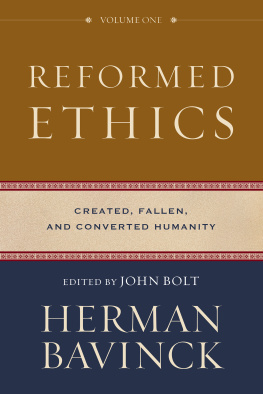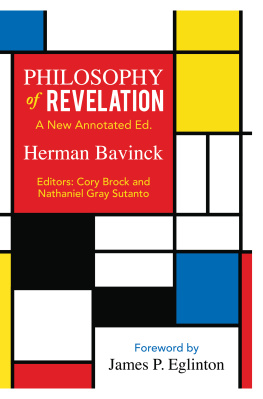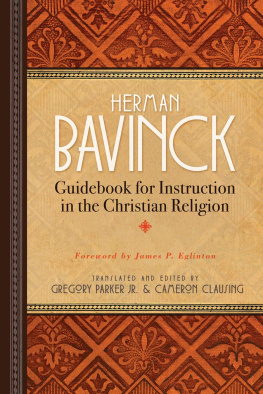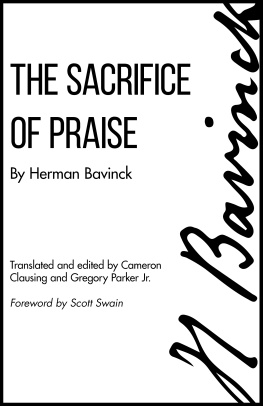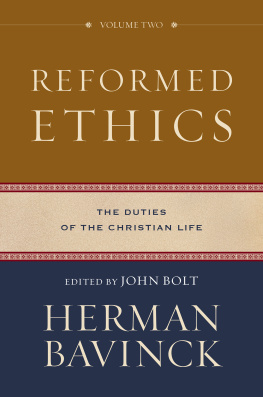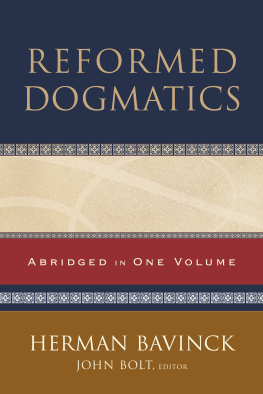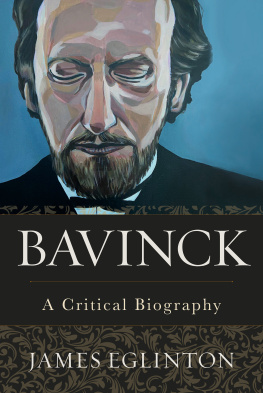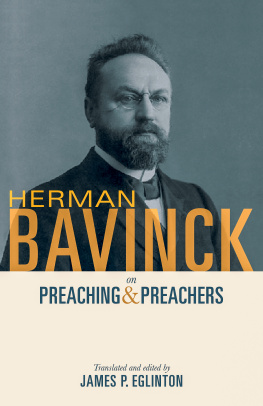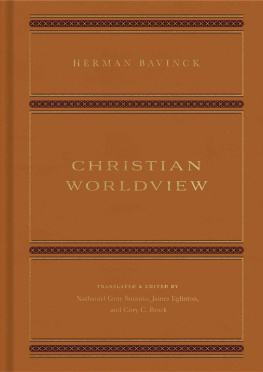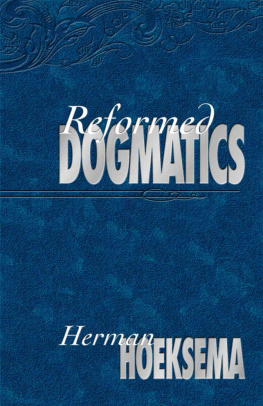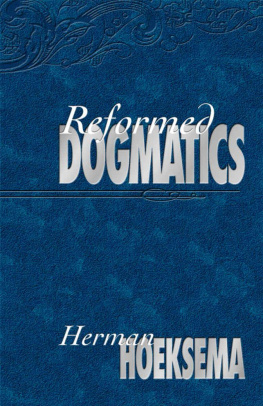Contents
Cover
Half Title Page
Title Page
Copyright Page
Dedication
Editors Preface
Abbreviations
Introduction to Herman Bavincks Reformed Ethics by Dirk van Keulen and John Bolt
Introduction
1 Historical Overview of Christian Ethics
2 Terminology
3 Division and Organization of Ethics
4 Foundation and Method of Ethics
Book I Humanity before Conversion
1. Essential Human Nature
5 Human Beings, Created in Gods Image
6 The Content of Human Nature
7 Human Relationships
2. Humanity under the Power of Sin
8 The Devastation of the Image of God in Humanity
9 The Organizing Principle and Classification of Sins
3. The Self against the Neighbor and God
10 Sins of Egoism in the Narrow Sense
11 Sins against the Neighbor
12 Sins against God
13 The Image of God in Fallen Human Beings
5. Human Conscience
14 The Conscience
6. The Sinner and the Law
15 The Law
16 Natural Morality
Book II Converted Humanity
7. Life in the Spirit
17 The Nature of the Spiritual Life
18 The Origin of the Spiritual Life
19 The First and Basic Activity of the Spiritual Life
8. Life in the Spirit in the Churchs History
20 Mysticism, Pietism, and Methodism
9. The Shape and Maturation of the Christian Life
21 The Shape of the Christian Life: The Imitation of Christ
22 The Growth of the Spiritual Life
10. Persevering in the Christian Life
23 Security and Sealing
11. Pathologies of the Christian Life
24 Diseases of the Spiritual Life and Their Roots
12. Restoration and Consummation of the Christian Life
25 Means of Restoration
26 Consummation of the Spiritual Life; Meditation on Death
Bibliography
Selected Scripture Index
Name Index
Subject Index
Back Cover
Editors Preface
The book you hold in your hands took a long journey to get there, an unlikely, unplanned, and uncharted journey. It is the first volume of a projected three-volume set that gives readers access to Herman Bavincks lectures on Reformed ethics, delivered to his students at the Theological School in Kampen, from 1883/84 through the fall of 1902. Though the work is methodologically identical to Bavincks Reformed Dogmatics , and there are hints that Bavinck may have intended eventually to publish it, he did not, leaving behind only a 1,100-page handwritten manuscript. After Bavincks death in 1921, the manuscript languished in the Bavinck Archives at the Historical Documentation Center for Dutch Protestantism (1800 to present) at the Vrije Universiteit, Amsterdam, until it was discovered by Dirk van Keulen in 2008. Readers of this volume are, therefore, among the privileged first group to gain access to Bavincks systematic reflection on theological ethics since his own students who heard the lectures in the last two decades of the nineteenth century.
History buffs love playing What if? parlor games, and the temptation is hard to resist when reflecting on the pilgrimage of this material from Bavincks own hand to this published translation. The word that comes to mind for me, with intentional bilingual wordplay, is wonder. In the Dutch language (German Wunder ) the word means miracle. I want to be careful not to devalue the word miracle with overuse, but it is accurate to say that I and the editorial team that worked on this project are filled with wonder and awe at Gods gracious, providential care and guidance as we make this work available for the worldwide church. Not only were we richly supplied by generous a series of connected events that positively and constructively accumulated to help publish this work. In remarkable ways, today has proved to be just the right time for this project.
This project is unimaginable without the preparatory project of translating and publishing the English version of Bavincks four-volume Reformed Dogmatics , completed in 2008. To commemorate this occasion, along with the centenary of Bavincks Princeton Stone Lectures, The Philosophy of Revelation, To sum this up: the Reformed Dogmatics project paved the way for these Reformed Ethics volumes by bringing together people (including a supportive publisher) who had demonstrated the competent ability to complete it; and the positive reception of the Reformed Dogmatics also created a large audience of students, pastors, and scholars eager to see this work on ethics become available.
In addition, to be able to speak of a group of Bavinck scholars in 2008 was itself quite remarkable. When I completed my dissertation on Bavinck in 1982, sixty years after Bavincks death, mine was only the fifth doctoral dissertation devoted to Bavincks theology;
All this is to say that conditions were ripe for generating interest and support for translating and publishing Bavincks Reformed Ethics in English. But that is not all; we have to go back to the earlier and equally unlikely project of translating and publishing his Reformed Dogmatics . Bavincks Gereformeerde Dogmatiek was well known and appreciated in North America, and an early attempt was made to translate it into English.
With this popularity of Berkhofs Systematic Theology in view, who could have contemplated the possibility of translating Bavincks four-volume Gereformeerde Dogmatiek into English? Why would a publisher take on this major project of bringing a late nineteenth-century Dutch theology, and a competitor to Berkhof, into print? By the 1990s the memory of Herman Bavinck had practically vanished from the Dutch immigrant community of Reformed people, restricted for the most part to the Christian Reformed Church of North America, a relatively small denomination. Where would the market be for such a venture? Who was interested? To be truthful, while I was still in the dissertation-writing stage of my PhD program, a Canadian publisher, knowing that I was working on Bavinck, passed on to me a translation of one section and asked for advice about publishing it. For a variety of reasons, I strongly recommended against it. When I began teaching at Calvin Seminary in the fall semester of 1989, the very notion of translating this work was farthest from my mind. If the efforts in the 1930s had floundered, among other reasons undoubtedly because of the worldwide Depression, who today would be willing to front the required cost, now substantially increased? The prospect for this project was remote and its possible success highly unlikely. And then...

